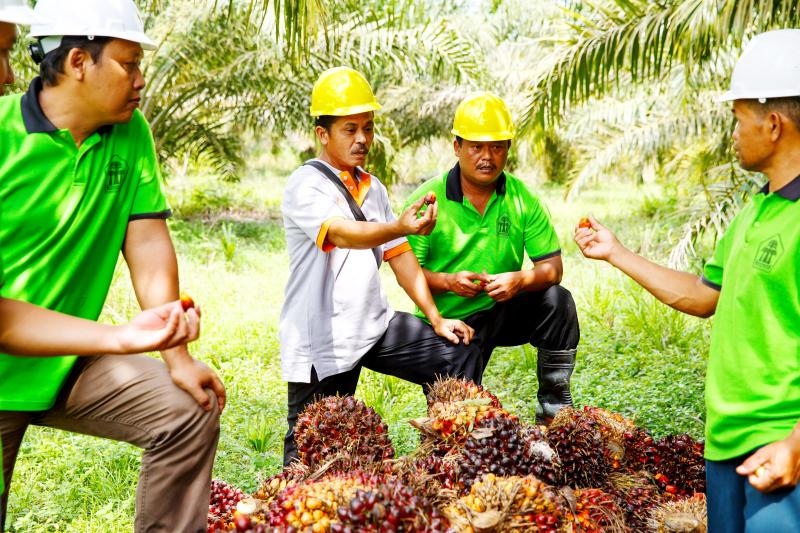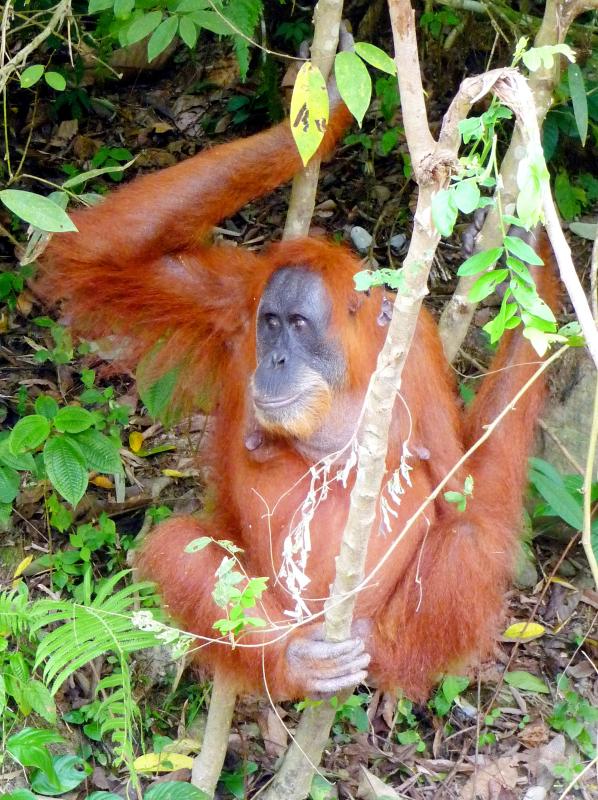The farming of African oil palms, which has transformed vast areas of Malaysia and Indonesia, is one of the world’s most controversial types of agriculture.
Demand for palm oil — a common ingredient in processed foods and personal care products — drives deforestation and the destruction of tropical peatlands. To make space for oil-palm plantations, tracts of forest are cleared, sometimes by bulldozer, but often by burning. Forest fires release huge amounts of carbon dioxide, the principal greenhouse gas, as well as soot.
In Sumatra and Borneo, orangutans, rhinos, elephants and tigers are losing their habitats to the African oil palm, as are clouded leopards, pangolins, macaques and tapirs. Several of these species are vulnerable; some are critically endangered.

Photo courtesy of the Roundtable on Sustainable Palm Oil
In Europe in particular, photos of orphaned orangutans upset consumers. Fearing boycotts, retailers have sought alternatives to palm oil, or to source the commodity from growers certified by the Roundtable on Sustainable Palm Oil (RSPO). This Kuala Lumpur-based NGO develops and implements global standards for the environmentally and ethically-sound production of palm oil.
The industry-dominated RSPO is not without its problems. It has been accused of greenwashing and, as recently as last month, of certifying palm oil produced on plantations guilty of serious labor abuses.
Switching from palm to other oils could be even worse for the environment. Joe Fassler, in the March 2016 issue of Smithsonian Magazine, points out that: “No other crop can yield even a third as much oil per acre planted. And along with using less land, the oil palm gobbles up significantly fewer pesticides and chemical fertilizers than coconut, corn or any other vegetable oil source.”

Photo: Steven Crook
At the end of 2018, British supermarket chain Iceland ceased manufacturing products which contain palm oil. By May 2019, UK department-store chain Selfridges had eliminated palm oil from its own-label range. British online retailer Ocado lists more than 2,100 palm oil-free items on its Web site.
CONSUMER PRESSURE LACKING
According to Carrefour’s global Web site, since 2015, 100 percent of the palm oil used in its own-brand products has come from RSPO-certified suppliers.
Carrefour, which has 131 stores in Taiwan, began working with RSPO in 2006. The French multinational’s palm oil procurement policy now includes RSPO standards “and additional requirements to do with protecting forests and peat bogs.”
In 2019, 86 percent of the palm oil shipped to Europe met RSPO standards. RSPO says it can’t provide a figure for Taiwan, but the behavior of local manufacturers and retailers — even those doing the right thing — suggests that local consumers’ priorities do not include saving the orangutan.
Sifting through Carrefour’s Taiwan Web site turns up very few mentions of sustainable palm oil. The frozen scallion pies and pancakes supplied by Taipei-based Laurel Corp are made using “green and sustainable internationally certified palm oil,” but that’s about all.
Searching for palm-oil free products brings up just three items. Two are car-care products; the third is a nut-flavored spread imported from France. Surely other items on Carrefour’s shelves in Taiwan include sustainable palm oil, or no palm oil whatsoever, but it seems there’s no incentive to highlight this characteristic.
The Environmental Impacts section of Costco’s global Web site says the company is committed to ensuring that all palm oil and other palm-based derivatives and fractions in its Kirkland Signature products “will be 100-percent RSPO certified (or equivalent) by 2021 or sooner.” This policy applies to the local sourcing team in Taiwan as well as to non-Kirkland Signature products made elsewhere. However, Costco’s Taiwan Web site currently doesn’t acknowledge this undertaking.
The Web site of RT-Mart, which operates 22 stores around Taiwan, makes no mention of sustainable palm oil. Nor does that of PX-Mart, a chain of 1,015 supermarkets.
By contrast, the English and Chinese versions of Hsin Tung Yang’s 2019 Corporate Social Responsibility Report highlight the company’s decision to begin using sustainable palm-oil products. In 2019, 14.3 percent of the palm oil purchased by Hsin Tung Yang — known for the meat jerkies and pineapple cakes it sells at Taiwan’s airports — was RSPO certified.
The number of Taiwanese companies holding RSPO membership grew in 2020 to 42, but Hsin Tung Yang and Laurel Corp aren’t among them.
Units of some high-profile conglomerates, including Uni-President Enterprises Corp and Want Want Holdings Ltd, have signed up to RSPO. Certain household names like I-Mei Foods Co (palm oil is an ingredient in its ice cream) and Kuai Kuai Co (whose signature snack includes palm oil) aren’t in the grouping.
Joining RSPO doesn’t necessarily mean a wholehearted embrace of the organization’s principles. As an e-mail from Chi Mei Frozen Food Co — an associate member since mid-2018, and the only local food producer willing to discuss the issue of palm oil with this reporter — concedes, if it weren’t for supply-chain pressure from outside Taiwan, there’d be even less progress on this issue.
“So far, we only use sustainable palm oil in one product [a type of frozen guabao bun], that is exported to Europe because our customer requires it. And we don’t use much of the oil since COVID-19 has hit the economy badly all over the world,” says a member of the company’s marketing and planning department.
GLOBAL PROBLEM
Taiwan isn’t the only place where food companies and soap manufacturers aren’t eager to source the palm oil they use from responsible growers.
China imported 8.49 million tonnes of palm oil in 2019, according to China Dialogue, an NGO that investigates the country’s environmental challenges. Less than 2 percent of it was RSPO-certified.
In Taiwan, several Chinese-language media have reported the consequences of the palm-oil industry’s rapid expansion. Local NGOs like the Environmental Information Center (環境資訊中心, e-info.org.tw) are trying to educate the public.
In recent years, palm oil has sold for between US$600 and US$750 per tonne, with a tonne of sustainable palm oil costing around US$30 more. This premium doesn’t make much difference to the cost of items on supermarket shelves, because palm oil is a minor ingredient in most finished products.
Ten years ago, CommonWealth magazine reported that in a nine-country survey of green consumerism, 24 percent of respondents were willing to pay more for eco-friendly goods, while according to the magazine’s own survey, 80 percent of Taiwanese respondents were amenable to paying a green premium.
Kantar’s Purpose in Asia report on consumer concerns, published in late 2018, found that Taiwanese were the only group (of nine Asia-Pacific nationalities surveyed) to put “climate action” among their top three concerns. Air pollution afflicting Taiwan was the top environmental issue.
Could it be that local consumers are still unaware of the ubiquity of palm oil in everyday products? Or that they say one thing, but do another when it comes to spending their own money? Or, perhaps, their interest in environmental issues doesn’t extend beyond the country’s borders? For the sake of Southeast Asia’s forests, it’s time local consumers began putting pressure on supermarkets and the companies they buy from.
Steven Crook, the author or co-author of four books about Taiwan, has been following environmental issues since he arrived in the country in 1991. He drives a hybrid and carries his own chopsticks.

Jacques Poissant’s suffering stopped the day he asked his daughter if it would be “cowardly to ask to be helped to die.” The retired Canadian insurance adviser was 93, and “was wasting away” after a long battle with prostate cancer. “He no longer had any zest for life,” Josee Poissant said. Last year her mother made the same choice at 96 when she realized she would not be getting out of hospital. She died surrounded by her children and their partners listening to the music she loved. “She was at peace. She sang until she went to sleep.” Josee Poissant remembers it as a beautiful

For many centuries from the medieval to the early modern era, the island port of Hirado on the northwestern tip of Kyushu in Japan was the epicenter of piracy in East Asia. From bases in Hirado the notorious wokou (倭寇) terrorized Korea and China. They raided coastal towns, carrying off people into slavery and looting everything from grain to porcelain to bells in Buddhist temples. Kyushu itself operated a thriving trade with China in sulfur, a necessary ingredient of the gunpowder that powered militaries from Europe to Japan. Over time Hirado developed into a full service stop for pirates. Booty could

Before the last section of the round-the-island railway was electrified, one old blue train still chugged back and forth between Pingtung County’s Fangliao (枋寮) and Taitung (台東) stations once a day. It was so slow, was so hot (it had no air conditioning) and covered such a short distance, that the low fare still failed to attract many riders. This relic of the past was finally retired when the South Link Line was fully electrified on Dec. 23, 2020. A wave of nostalgia surrounded the termination of the Ordinary Train service, as these train carriages had been in use for decades

Lori Sepich smoked for years and sometimes skipped taking her blood pressure medicine. But she never thought she’d have a heart attack. The possibility “just wasn’t registering with me,” said the 64-year-old from Memphis, Tennessee, who suffered two of them 13 years apart. She’s far from alone. More than 60 million women in the US live with cardiovascular disease, which includes heart disease as well as stroke, heart failure and atrial fibrillation. And despite the myth that heart attacks mostly strike men, women are vulnerable too. Overall in the US, 1 in 5 women dies of cardiovascular disease each year, 37,000 of them